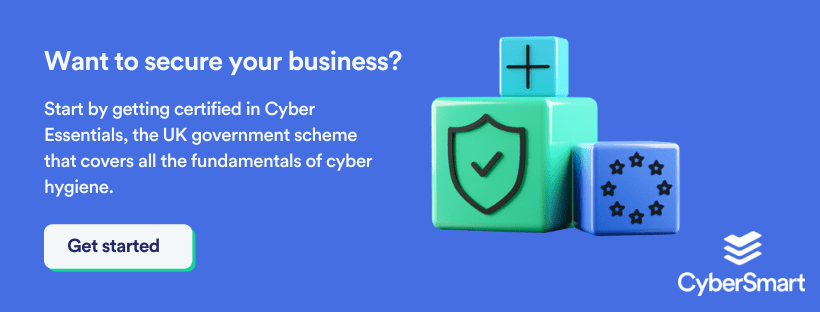You’ve likely heard the term ‘cybersecurity policy’ before. But what is it? And why does your company need one?
What do we mean by ‘policy’?
A ‘policy’, in cybersecurity terms, is a set of principles that guide decisions within an organisation. These principles can inform the decisions senior management make or guide employees in their day-to-day activities. A great example of the latter is a password policy.
What is the purpose of a policy?
A well-crafted policy can help your organisation achieve its goals, say reducing the risk of phishing attacks or compliance with Cyber Essentials. Any policy worth its salt should outline what employees should or shouldn’t do, offer directions on best practices, and guidance for decision making.
Why are policies so important?
According to research, 90% of security breaches occur through human error. However, improving your cybersecurity isn’t about blaming employees for their all-too-human mistakes. It’s about giving your people the tools and knowledge to better protect themselves.
According to research, 90% of security breaches occur through human error
This is where policies come in. Policies and procedures provide a roadmap for day-to-day operations. They ensure compliance with laws and regulations, offer guidance, and even help employees make better decisions. After all, if your people don’t know which behaviours are harmful, they can’t correct them.
But clear, readily available policies have benefits beyond merely reducing the likelihood of a successful security breach. Here are just a few.
Improved efficiency
Sometimes clear policies are all that stand between a business and organised chaos. Sure, everyone’s working, but are they all pulling in the same direction? Or adhering to company values?
When everyone is following policies and procedures, a business will generally run smoothly. Management structures and teams operate as they’re meant to while mistakes and hiccups in processes can be quickly identified and addressed.
What’s more, when everyone understands what’s expected of them and goals are clearly defined, time and resources are managed more efficiently. And this will ultimately help you meet targets and grow.
Better customer service
There’s nothing more frustrating than receiving wildly different service from two separate interactions with the same organisation. It could be your utility provider, GP surgery or bank, but we’ve all experienced the irritation it causes.
Having clear, easy-to-follow policies in place is a sure-fire way to stop your business from providing erratic customer service. When policies are followed, tasks are performed correctly and every customer receives the same high level of service – enhancing your business’s reputation to boot.
A safer workplace
Workplace accidents and incidents are far less likely to happen if everyone’s working to the same standards and principles. This not only reduces liability risk for your business but also cuts downtime and disruption. And, even if the worst does happen, you’ll weather it much better with a clear procedure on how to deal with it.
How can CyberSmart help?
We’ve discussed why policies are important but now comes the tricky bit. How do you ensure that everyone in your business has access to the policies they need to work safely? And, more important still, how do you make sure they read them?
CyberSmart Policy Manager allows you to digitally upload and share policies straight to staff’s devices through our platform, CyberSmart Active Protect. Policies can easily be uploaded through the CyberSmart Dashboard and made available to your users instantly.
What’s more, you can be sure your employees read them. Our Dashboard provides you with a digital audit trail of when policies have been read and agreed upon.
But what if you’re unsure of where to start when creating a new policy? Well, we’ve got you covered there too. We’ve put together a handy set of templates to help you get started. These are free to download from your CyberSmart Dashboard and easily modified to suit your business. Our policy templates include:
- Data Classification policy
- Cyber Essentials policy
- Data Protection policy
- IT Access policy
- Security Awareness and Training Guidelines policy
- Work From Home Covid-19 policy
We also offer a GDPR policy pack as part of our IASME and GDPR certification.
And that’s all there is to know about policies. They’re a simple tool, but one that provides an important first line of defence for your business against cyber threats. Hopefully, this blog has armed you with all the knowledge you need, but if you have any questions please get in touch, our team are always happy to help.
Looking to improve your cybersecurity but not sure where to begin? Start by getting certified in Cyber Essentials, the UK government scheme that covers all the fundamentals of cyber hygiene.











